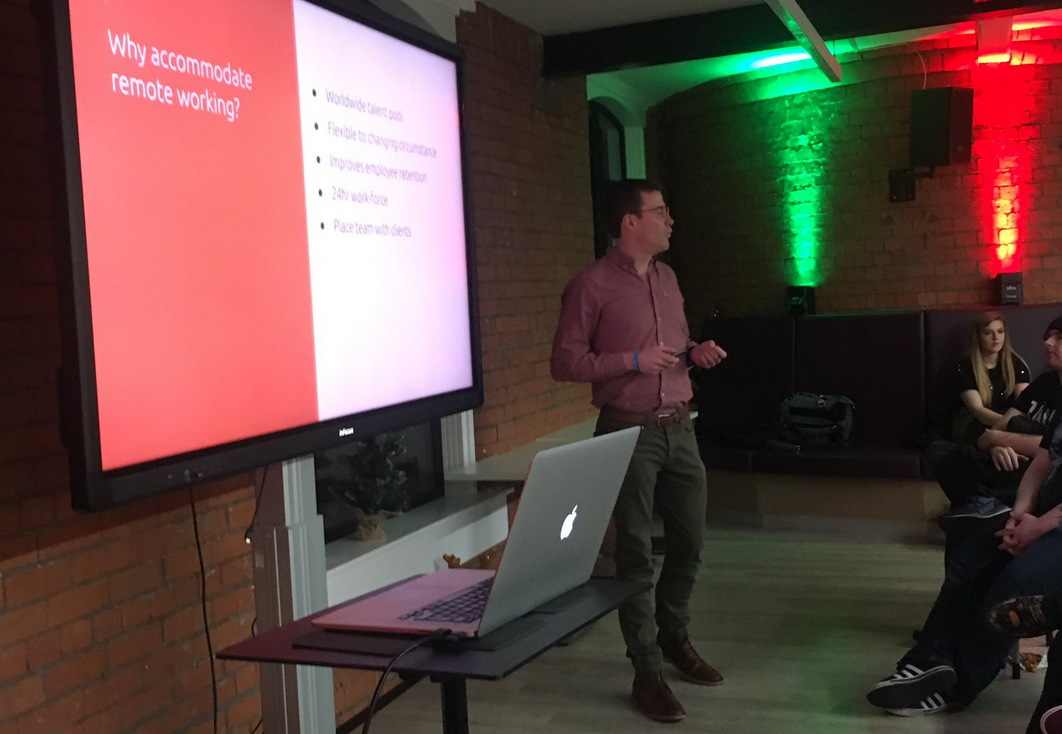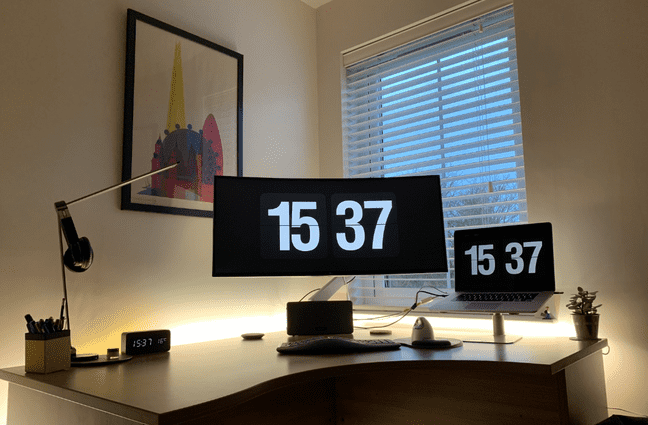Making remote work, work.
I recently gave a lightning talk at BelfastJS on how I make working remotely, work for me. Here, I expand on some of those themes.

I have been working remotely from home full-time for the past two years, and I love it.
Previous to this, I had always worked in an office environment, and now I wonder if I could ever go back to working an office full-time again.
I simply love the freedom working from home brings - be that the freedom from a daily commute sitting in traffic or the freedom to roam around my favourite coffee haunts with just my laptop on my back and my phone in my pocket (for tethering if WiFi is patchy).
Friends and family will often say to me when this topic comes up; "Oh, I could never do that, I'd get distracted too easily." The alternate view sometimes offered is; "I could never do that, I'd still be answering emails at 12 o'clock at night."
People seem to worry that they'd never be able to start working or they'd conversely never be able to stop working. Others would love to work remotely but feel they don't have the culture within their work environment to support it.
Everyone is, of course, different and your mileage may vary but here are some tips I've found help me.
Establish and nurture trust
When working remotely, trust is crucial.
That is to say, your customers, clients or manager must trust that you'll consistently fulfil or exceed any expectations placed upon you.
Problems will inevitably arise if you start to fall short without a good explanation as those who have placed their trust in you will start to wonder how you're filling your day.
Create your ideal workspace
A considerable advantage remote workers have over our office-dwelling colleagues is the ability to control our work environment.
I have a home office which I've gradually crafted to suit my needs perfectly.
Picking out my ideal desk, chair, screen and wall-art makes sitting down to work every morning a pleasure.
Having a separate room in the house for this also helps me create a divide between work-life and life-life.
Eliminate distractions
Distractions are everywhere. Nearly all of us carry a shiny, beeping, vibrating unrelenting distraction device on our person everywhere we go.
You need to eliminate distractions both in your physical environment but also in your virtual environment.
In the physical environment, if, for example, you have other family members at home while you work, you may need to agree with them not to disturb you when your office door is closed.
Virtually, certain tools and techniques to help this. Some steps I have taken include;
- Disabling the red notification indicator on all chat icons
- I've installed a Gmail app called Adios which will hold back my emails and only deliver them in batches, three times a day - 9am, 1pm and 5pm.
- Turning the sound and vibration on my phone off and placing it face down on the desk.
- Disabling the majority of my iPhone apps from pushing notifications.
- Muting all Whatsapp groups for 1 year
- I use a website blocker on a schedule. A myriad of distracting websites are blocked between 9am-1pm and 2pm-6pm.
Create a routine
One of the temptations of remote working is to upend the traditional nine-to-five and work unconventional hours. You can do this if it suits your team, but I find it's essential to maintain a routine.
A routine creates structure and consistency, both of which are conducive to productivity.
This will not only give you a strong indicator of when to start working and also a strong indicator of when to stop.
Exercise
One of the more dismaying aspects of working from home is the realisation of how little you move in the course of the day when your desk is mere metres from your bed.
When I was previously commuting to the office while living in London, I was regularly clocking up about 12,000 steps a day.
However, once I moved back to Belfast and started working from home, that plummeted to about 3000 steps a day. It's therefore very important to inject some regular exercise into your day.
One thing I've found that has really helped to regularly get me out and about, and which was only really possible because I now work from home, is acquiring a canine companion - in my case, Murphy, an energetic cocker spaniel.

No matter how deep you are in a tunnel of code, a young pup will let you know he has needs too and a brisk walk in fresh air is infinitely preferable to mopping up a mess on the kitchen floor. 😫
Communication
When you're not visibly in an office every day you need to find other ways to make yourself visible. you may even need to over-compensate a little bit. This may be daily status reports, piping up a bit more in team chat channels or taking on tasks not strictly in your remit but help remind others of your value to the team. Helping to clear a backlog of Pull Requests is a good example of this. You should also be mindful that if you're deep in the trenches of the particular task and but making any visible progress to your wider team, you should flag that up. You know you're working hard and making incremental progress but no-one else does unless you tell them.
In conclusion
Trust, discipline and communication are key to making remote work, work in my opinion. But, once you get it right, it's magic. 👌🏻

